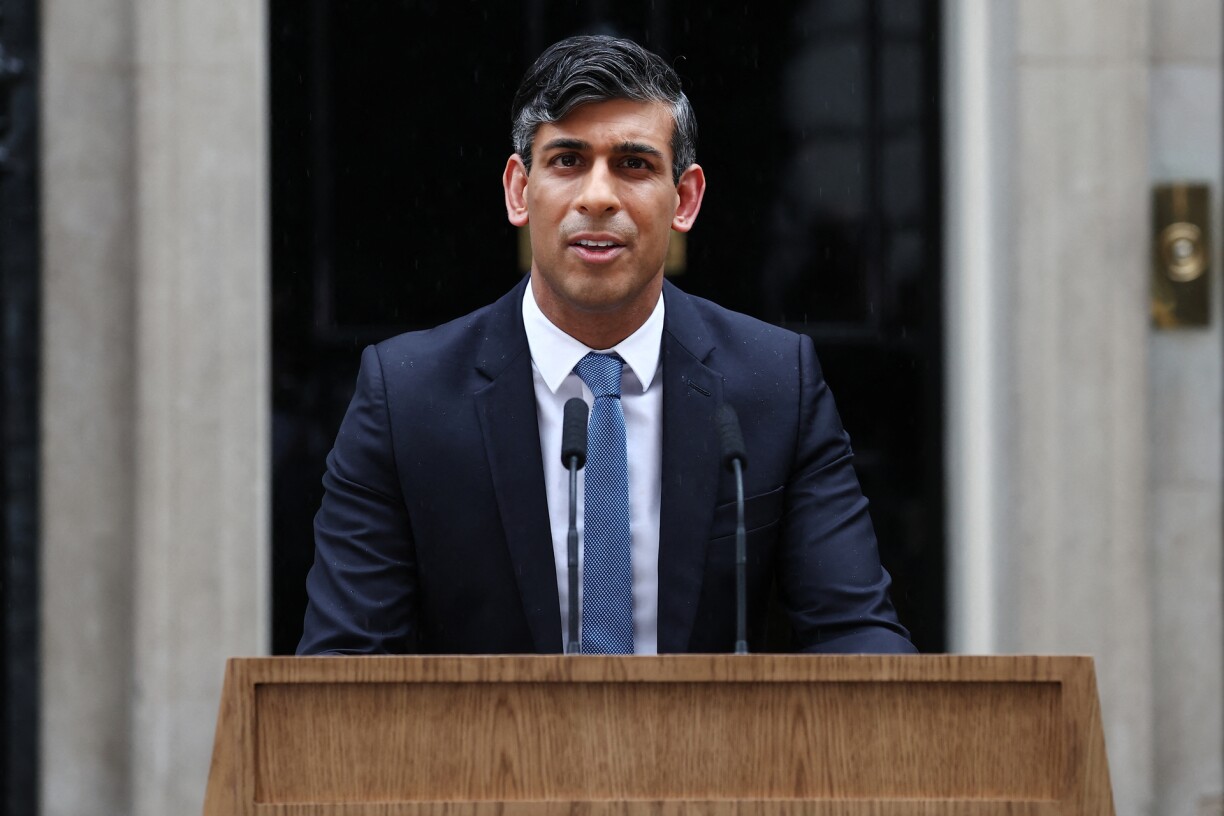
July’s election will see Labour’s Keir Starmer bid to take power after 14 years of Conservative government, marked by a series of scandals and no fewer than five different prime ministers.
Current incumbent Rishi Sunak refused to rule out a July election when asked in Wednesday’s Prime Minister’s Questions session. He later issued a statement outside Downing Street following a meeting with his cabinet ministers, taking to the lectern before the assembled media in the pouring rain.
Sunak first highlighted his government’s handling of recent “challenging, generation-defining times”, such as the pandemic and the Russian invasion of Ukraine, before confirming plans to hold a general election on Thursday 4 July.
“Earlier today I spoke with His Majesty the King to request the dissolution of parliament. The king has granted this request and we will have a general election on July 4,” he said.
The poll will be the first time Sunak, 44, faces the public while in charge, after he was appointed leader of the largest party in parliament in an internal Conservative vote in October 2022.
The vote -- the third since the Brexit referendum in 2016 -- comes as Sunak seeks to capitalise on better economic data to woo voters hit by cost-of-living rises.
Halving inflation within a year from historic highs of above 11.0 percent at the end of 2022 was one of the former financier’s five key pledges.
That happened last year and on Wednesday rates slowed to a near three-year low at 2.3 percent in March, prompting finance minister Jeremy Hunt to declare: “This is proof that the plan is working.”
Political commentators have increasingly suggested that Sunak, trailing badly in the polls to the main opposition Labour party, could try to seek a bounce from the healthier outlook.
But critics point out that is more to do with changes in the global economy than government policy.
Recent polls have consistently made grim reading for the UK prime minister, predicting a wipeout for his ruling Conservatives.
The latest YouGov/Times voting intention poll has the Conservatives on 20 percent and Labour on 47 percent, while an average of major polls collated by The Economist gives Labour a 23 point lead.
Just as concerning for the Tories is the durability of the opposition’s poll lead, which has been around 20 points since Liz Truss’s disastrous and short-lived term as prime minister in late 2022.
The Conservatives, who have been in power since 2010, have not come out ahead of Labour in the average of polls since 2021.
Polling expert John Curtice predicted that if the trend was repeated on the July 4 election day, the Conservatives could win even fewer seats than in their 1997 wipeout by Labour under Tony Blair. Then, they ended up with just 165 seats out of 650.
The economy -- hit by external factors such as Covid and more self-inflicted wounds such as Brexit and Liz Truss -- will be a key battleground.
But Sunak faces an uphill task to convince the public that the country’s finances are still safe in Tory hands after 14 years in power.
Sunak has tried to steady the ship since succeeding Truss, whose 49-day tenure ended after her unfunded tax cuts sent household bills soaring, spooked the markets and crashed the pound.
Immigration -- another key issue since the government’s vote-winning pledge to “take back control” of Britain’s borders after Brexit -- remains politically troublesome.
Sunak -- the Tories’ fourth leader since 2016 -- has talked tough to “stop the boats” of irregular migrants crossing the Channel from northern France.
But his controversial scheme to deport asylum seekers to Rwanda has yet to get off the ground, as costs and legal challenges mount.
Resurgent Labour, under former human rights lawyer Keir Starmer, has meanwhile been consistently ahead of the Tories by 20 points for almost two years now.
That has sparked talk of a landslide similar to the first of Tony Blair’s three election victories -- and even a near wipe-out for the Tories.
Starmer, 61, and his top team have in recent weeks been putting flesh on the bones of their election pitch, nearly five years after the party was thrashed by Boris Johnson and his vow to “Get Brexit Done”.
Last week, Starmer set out six key pledges notably more electorally friendly than the hard-left policies of his divisive predecessor Jeremy Corbyn.
Starmer, a pro-European centrist, promised economic stability, shorter health service waiting times and a new border security command to tackle irregular immigration.
He also vowed to establish a publicly-owned clean energy company, crack down on anti-social behaviour with more neighbourhood police and recruit 6,500 new teachers.